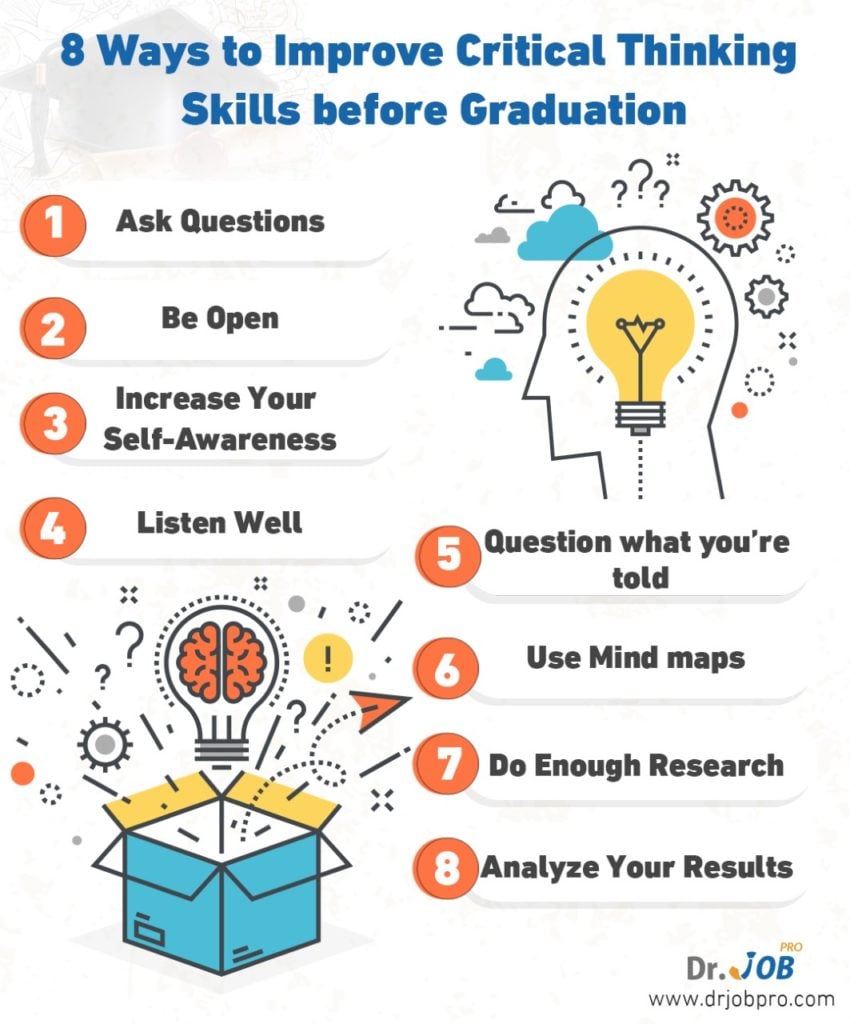When you use critical thinking, you process information methodically and intentionally to make better judgments and better understand the world.

Critical thinking is to think clearly and objectively, free of personal prejudice, emotional reactions, and subjective judgments.
Read also, 7 Ways to Improve Your Soft Skills before Graduation
That is looking at the information available and making an informed decision without being swayed by tradition or doing things the same way they've always been done.
Why is critical thinking necessary for building a career?
Critical thinkers are strongly demanded in the workplace, where decisions on performing tasks, presenting information, interacting with coworkers, and establishing strategy are prevalent.When you apply your critical thinking abilities in the job, you'll be seen as a problem solver. Demonstrating your problem-solving and goal-accomplishing skills can assist in building trust among your colleagues.
Moreover, it helps you land more job opportunities after graduation.
Dr. Job Pro is here to guide you to improve your critical thinking skills and get the best careers.
Here are eight ways to improve your critical thinking skills before graduation.

1- Ask Questions

Asking questions is a fantastic approach to learn more about a subject while also gaining different perspectives.
Never be afraid to seek clarification by asking questions whenever you're unsure about anything.
To ensure you've understood correctly, ask to have certain parts repeated or think about rephrasing what was said.
Asking follow-up questions can help you acquire information that was missed or misheard.
2- Be open

As simple as it may sound, critical thinking calls on you to set aside your personal beliefs and biases in favor of accepting new information.
It would help if you didn't assume that since you've always done something a certain way, it's the correct way to do it now. Examine your views and assumptions and see if they hold up to scrutiny.
Try to accept other people's points of view and arguments, and you never know what you could learn.
3- Increase your self-awareness

Discovering your unique set of preferences, strengths, and limitations, as well as your implicit biases, might assist in explaining your behavior in various scenarios.
4- Listen well

Moreover, learn to empathize with others and see things from their point of view (s). Knowing what they want, need, and anticipate can help you react positively and have a fruitful dialogue with them in the next moments.
5- Question what you're told

When learning anything new, it's a good idea to probe the source for proof to back up their claims.
Consider whether there are any alternative options. Make a well-informed choice by examining both sides of the story or situation.
6- Use mind maps

Common sense and capturing intuitive thoughts are the most remarkable ways to use mindmaps for brainstorming.
Here's how to make your first mindmap if you've never done it before. Let's assume your goal is to eat healthy food as an illustration.
Start with the core block, 'I need to eat healthy food,' then work your way outward. The initial level of branching asks you to select between several possible approaches to achieving your objective.
7- Do enough research

Take your time to do enough research and focus on developing, which will help you improve critical thinking.
Furthermore, self-research goes hand in hand with not accepting everything you're told as a fact.
If you're at a library or on the internet, go deeper and go down the rabbit hole. When it comes to addressing difficulties, research is your best friend.
8- Analyze your results

Trying to learn everything from textbooks isn't going to cut it anymore. To construct strong arguments backed by facts, you must think critically about the information presented and judge for yourself.
Engaging in interactions with other students, whether in the classroom or the common areas of your student residence, is an excellent method to improve critical thinking abilities.








 2023-04-26
2023-04-26
 2023-04-04
2023-04-04
 2023-03-22
2023-03-22
 2023-03-20
2023-03-20
 2023-03-08
2023-03-08